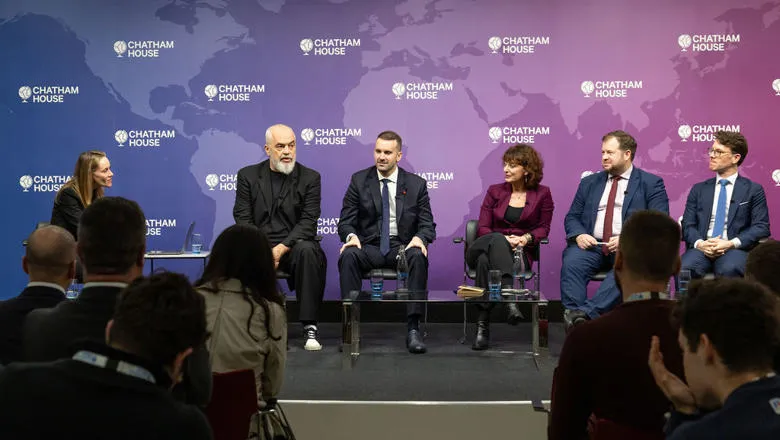Ahead of the Berlin Process Summit, Dr. Andi Hoxhaj OBE of King’s College London convened an expert panel at Chatham House, bringing together the prime ministers of Albania and Montenegro alongside the UK’s Minister for Europe to discuss the future of EU–Western Balkans relations and regional security challenges.
The discussion, chaired by journalist Nina dos Santos, featured Albanian Prime Minister Edi Rama, Montenegro’s Prime Minister Milojko Spajić, UK Minister for Europe Stephen Doughty, Dr. Andi Hoxhaj, and senior researcher Natalie Sabanadze. The participants examined the stalled progress toward EU enlargement, the region’s readiness for reform, and the political will within Brussels and European capitals to move forward with accession.
Over the past two decades, the Western Balkans’ path to EU membership has been uneven, with democratic and economic advances often offset by concerns over corruption, rule of law, and political instability. Speakers debated whether full enlargement remains a realistic prospect or if new frameworks for gradual integration might emerge.
Hoxhaj proposed that the EU should consider giving candidate countries access to the Single Market before full membership. Such a phased approach, he said, would allow gradual alignment with EU standards while supporting economic growth and stability in the region.
He also urged the UK to broaden its engagement with the Western Balkans beyond migration and organized crime, calling for long-term partnerships based on shared democratic values and sustainable development. “A multidimensional approach could foster deeper cooperation and shift perceptions in the UK toward a more constructive relationship with the region,” Hoxhaj said.
Separately, Dr. Hoxhaj hosted a closed-door roundtable at the Royal United Services Institute (RUSI) with Kosovo’s Prime Minister Albin Kurti, British lawmakers, academics, and civil society representatives. The session focused on defence and security threats facing the Western Balkans, including external malign influences, and how regional governments could become contributors rather than consumers of European security.



